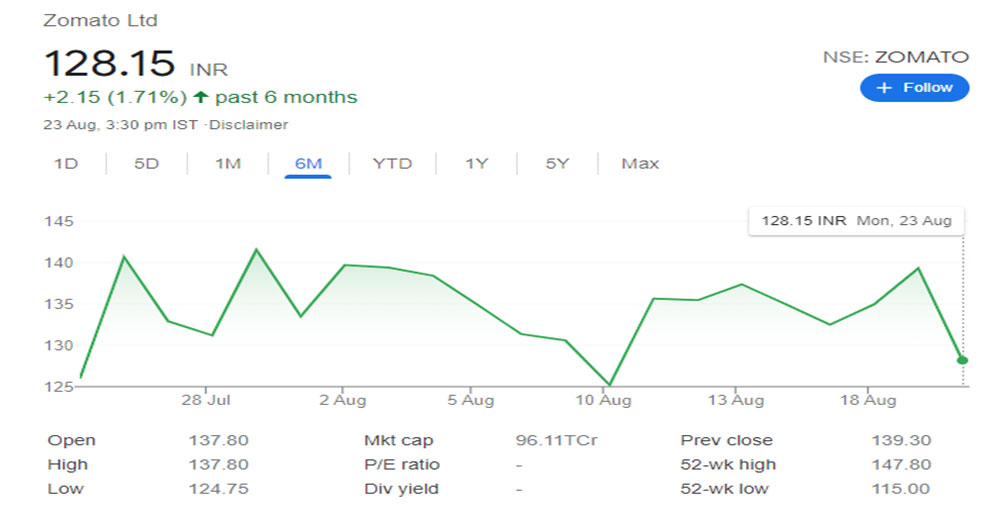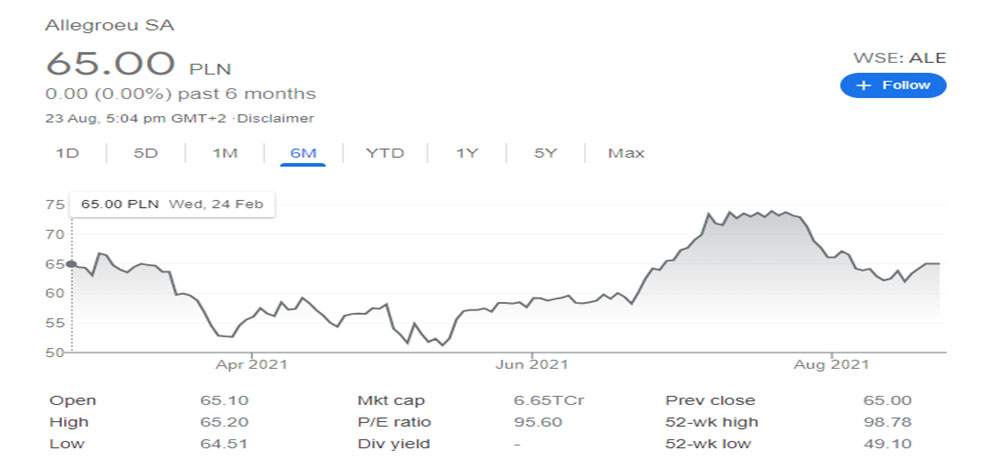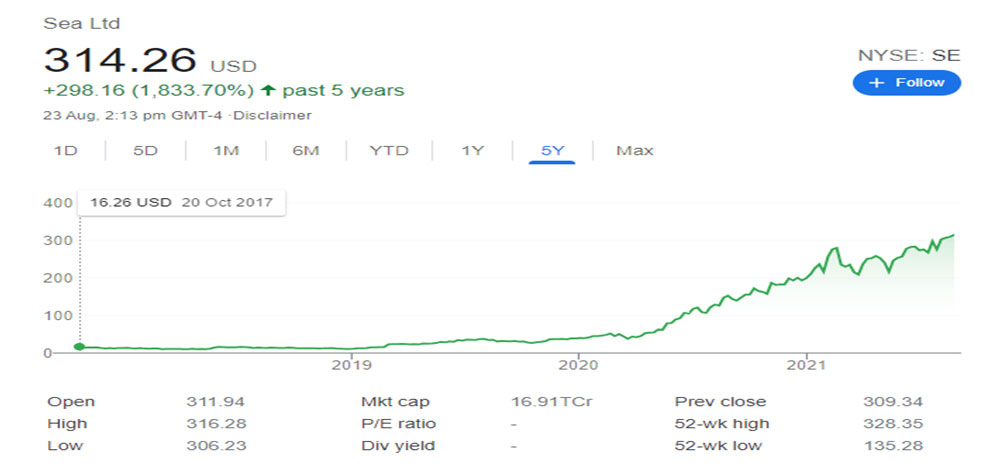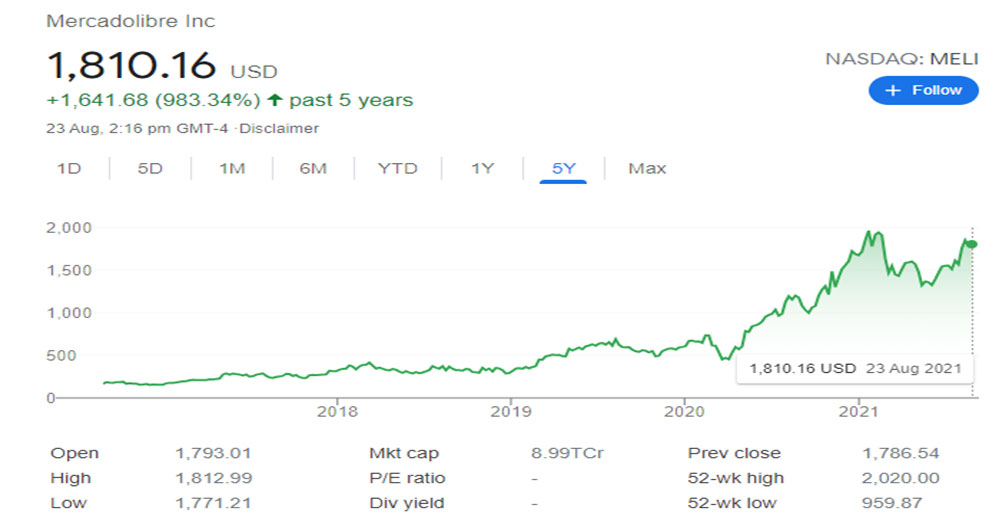How did Zomato listing impact the e-commerce stocks in EMs?
Synopsis: It has been a phenomenal year so far for the initial public offerings (IPOs) in India. Zomato Limited, the food-delivery start-up, went public in July 2021 and, despite no profitability in sight, generated an unprecedented investor frenzy. Zomato’s USD 1.25 bn initial public offering, attracted a phenomenal response from the global and domestic investors with 38.25 times applications- the highest in the last 13 years among IPOs which were valued at more than Rs 50 bn each. The stock listed at a significant premium and has been more or less steady since then. Zomato had raised around USD 550 mn from anchor investors ahead of its IPO. The anchor investors included BlackRock, Tiger Global Investments Fund, Fidelity, New World Fund Inc, JP Morgan, Morgan Stanley Asia, Goldman Sachs, T Rowe Price, Canada Pension Plan Investment Board (CPPIB), Government of Singapore, Monetary Authority of Singapore and Abu Dhabi Investment Authority (ADIA). However, Zomato IPO has drawn sharp reactions among the investors. In this EMAlpha insight, we look at how the stock price of some of the e-commerce companies from the other emerging markets have been performing and if there was any impact of Zomato on them. The global investors are agile and investing opportunities in one market affect others for sure. In e-commerce, emerging market platforms such as Sea Ltd, MercadoLibre (MELI), and Allegro make an interesting comparison to Zomato. As an investor, will you be optimistic or pessimistic depends upon whether: Zomato will follow Sea or MELI, or will it go down the Allegro path?
Zomato IPO: Milestone moment for e-commerce start-ups in India
This year has been great so far for initial public offerings (IPOs) in India. In the year 2021, the amount of money raised in IPOs has already reached USD 8.8 billion, more than the total of the past three years. Zomato Limited, the food-delivery start-up went public in July and, despite no profitability in sight, generated an unprecedented investor frenzy.
Zomato’s Rs 93.75 bn (approximately, USD 1.25 bn) initial public offering, which opened for subscription on July 14 for three days, saw a stellar response from investors with 38.25 times applications- highest in the last 13 years among IPOs valued at more than Rs 50 bn each. The stock listed a few days later, at a significant premium and has been steady since then.
The other interesting part is that this steady stock price performance since the listing is despite very poor 1Q FY22 (1st April 2021 – 30th June 2021) results. Zomato reported a net loss of Rs 3.56 bn on a consolidated basis in the first quarter of the current financial year, compared to Rs 998 mn in the first quarter of FY21. The company attributed this loss to higher expenses and impact on the dining-out business due to the second wave of the COVID-19 pandemic. The market was not much bothered. It seems that most of the large institutional investors are patient and not really concerned about the losses and see Zomato as a game-changer in the segment.
Figure 1: Zomato Stock price since listing

Source: Google
The leading food delivery platform, Zomato had raised around USD 550 mn from anchor investors ahead of its initial share sale. The company allocated 5,52,173,505 equity shares to anchor investors for Rs 76 apiece. The anchor investors included BlackRock, Tiger Global Investments Fund, Fidelity, New World Fund Inc, JP Morgan, Morgan Stanley Asia, Goldman Sachs, T Rowe Price, Canada Pension Plan Investment Board (CPPIB), Government of Singapore, Monetary Authority of Singapore and Abu Dhabi Investment Authority (ADIA).
Zomato and other e-commerce players from Emerging Markets
Zomato IPO has drawn sharp reactions among the investors. While the supporters claim that Zomato is a category creator and right now the focus should be on market dominance and it is only a matter of time before financials will start looking better on profitability, the critics say that it is only a cash guzzling machine and the moment external funding support stops, the business which is already unsustainable will stop growing.
We think it is important to also look at the context. The e-commerce start-ups from emerging markets have a very long runway ahead of them for growth. This makes them a prime target for global investors looking for growth and when companies like Amazon trade at stratospheric valuations, the e-commerce companies from emerging markets won’t also be left behind. This is all good and supports the view that Zomato may do well.
However, it is also important to see that apart from market dominance, how these companies fare on two important parameters: a) how sticky the customer is, and, b) how deep is the ‘technology’ moat? In this EMAlpha insight, we look at how some of the e-commerce companies from the other emerging markets have been doing and if there was any impact of Zomato on them. The global investors are agile and investing opportunities in one market affect others for sure.
Interestingly, some of the brokers were pushing Zomato by highlighting that Zomato’s higher valuation multiples need to be seen in the context of higher growth. In e-commerce, emerging market platforms such as Sea, MELI, and Allegro trade at a premium to Chinese and developed market peers due to superior growth rates. Let’s begin with Allegro, which is one of the leading e-commerce trading companies in Poland.
Allegro: The Amazon of Poland
Allegro was founded in 1999 and today, the Allegro platform is one of the most trusted online Polish marketplaces. According to the report “E-commerce in Poland 2019” conducted by Gemius, 80% of respondents identified the Allegro platform as their preferred brand in the e-commerce industry. There is a massive opportunity for Allegro to grow because it is the market leader by a significant margin in an industry that is still underpenetrated.
As per OC&C analysis 2019, referred to in the company presentation from December 2020, Allegro is 12x larger than the next online player in Poland, and the current figure for e-commerce penetration in Poland stands at only 8%. As per the company, Allegro has more than 125,000 merchants, and each month, about 20 million customers visit their platform, equivalent to 80% of all Internet users in Poland. Allegro is the largest non-food retailer by Gross Merchandise Value (GMV) in Poland, and it is also one of the world’s top ten e-commerce players.
Allegro is 12x larger than the next online player in Poland and Poland’s current figure for e-commerce penetration stands at only 8%. Needless to say, a vast, untapped market awaits. The market’s anticipation of a public offering from Allegro lasted many years until finally coming to fruition in September 2020. On 12th October 2020, the shares started trading at the Warsaw Stock Exchange in what was the largest IPO in Poland’s history. The bumper listing was expected as the demand from individual investors was at 6.6x that of the availability.
Figure 2: Allegro Stock price over last six months

Source: Google
After listing at almost 50% premium to the issue price, the price was up 15% the next day and within the first few days, the stock price was almost 100 PLN. And as they say, once you reach the summit there’s only one way to go: down. Since flirting with the highs of 100 PLN, the stock price performance has been disappointing. As it happened with many initial public offerings, the Allegro IPO and its aftermath is a story of exuberance followed by disappointment.
In the last few weeks, there has not been much in the news flow to explain the stock price correction. On the contrary, the financial performance has been robust and the news flow has been positive. According to a Reuters report, Allegro is moving forward with expansion plans and building its own parcel lockers network, its chief financial officer said after the company’s second-quarter results beat forecasts.
Sea Limited: A leading global consumer internet company in South East Asia
Sea Limited is a leading global consumer internet company founded in Singapore. It operates three core businesses across digital entertainment, e-commerce, as well as digital payments and financial services, known as Garena, Shopee, and SeaMoney, respectively.
- Garena is a leading global online games developer and publisher.
- Shopee is the largest pan-regional e-commerce platform in Southeast Asia and Taiwan.
- SeaMoney is a leading digital payments and financial services provider in Southeast Asia.
There has not been much of an impact on the stock price in the last five to six weeks and the stock continues to do well.
Figure 3: Sea Ltd. Stock price since listing

Source: Google
MercadoLibre: Largest e-commerce and payments ecosystem in Latin America
MercadoLibre is focused on enabling e-commerce and digital and mobile payments by delivering a suite of technology solutions across the complete value chain of commerce. It is present in 18 countries including Argentina, Brazil, Mexico, Colombia, Chile, Venezuela, and Peru. According to the company, based on unique visitors and page views, it is the market leader in each of the major countries where it is present. The stock has done exceedingly well in the last five to six weeks.
Figure 4: MercadoLibre (MELI) Stock since listing

Source: Google
How EMAlpha’s analysis of Unstructured data and ESG insights can help?
We have not deliberately included Chinese stocks in this analysis because the last few months have been volatile for Chinese tech stocks, courtesy of the policy decisions by the Chinese government. For example, the Education Technology (EdTech) space has been one of the fastest-growing areas in many emerging markets, including China. However, the recent developments in the space haven’t been positive. The Chinese Government has imposed strict regulations to disallow the EdTech companies operating with a profit motive.
Read More: Trouble in the EdTech paradise
While Allegro has taken a hit starting around the same time Zomato got listed despite an excellent result, there is not much of an impact on Sea Ltd and MELI. But there are always local and global developments that impact the stock price and the question is, how can this be incorporated into investment decisions? But first, can the local and global news flow analysis pick up issues efficiently?
For example, in the local media, the build-up before the Zomato IPO was an indication that there would be strong demand resulting in good enough listing gains. It was possible that the listing gains would be followed by underperformance. So far, this has not happened. But it is too early to take a final call on this. It is too early to say will Zomato mirror Allegro or Sea Ltd/MELI.
The other issue is that can regular analysis of social media be used as input before taking an investment decision? If yes, then how to do it in the most efficient manner? It is here that EMAlpha’s analysis of unstructured data becomes a much-needed tool for investors. The following are four major components wherein EMAlpha can aid investors.
- The local language along with English news analysis can be tracked for companies experiencing increased competition. Considering the sensitivities involved, these issues could escalate quickly, thus impacting the stock price performance.
- The unstructured data analysis in other geographies can also be used to assess the potential impact on some of the larger companies. A case in point being Amazon in Poland which is very similar to the impact it had on Flipkart in India.
- Predicting the behavior of large institutional investors can help forecast the stock price impact. This is one of the key features of the EMAlpha product as it combines technology with domain expertise. There are cases when fears are unfounded and that creates opportunity.
- The social media analysis provided by EMAlpha is useful in picking up the signals when the views change for retail investors as compared to the stand of institutional investors. In many cases across markets, this plays a crucial role.
It is pertinent to add here that the changes in perception on ESG track record of a company and reactions from institutional investors have become an important driver of stock prices and especially in cases where the volatility is high, it matters even more. The EMAlpha sentiment and ESG scores have been reasonably accurate and there is a strong link between stock price performance and these scores. This is helpful for asset managers in their decision-making.
Read More: Did Walmart push Flipkart on the ESG path?
The news spread has become much faster with social media and the internet. Some of the ESG related reports may be difficult to immediately verify and their authenticity could also be questioned, but they still influence the stock price movement. EMAlpha tracks news flow and helps in deciphering their impact on the stock price movement. EMAlpha’s sophisticated AI-ML tools and proprietary analytical methods are based on deep domain expertise and unmatched technological prowess, helping the investors with the most effective and efficient input.
References
- Zomato Delivers IPO Feeding Frenzy, 3 More Unicorns Line Up. The amount of money raised in IPOs this year has reached $8.8 billion, already surpassing the totals of the past three years though its only August. https://www.ndtv.com/business/zomato-ipo-feeds-india-startup-frenzy-inspires-paytm-flipkart-byjus-2513923 (Accessed on 24th August 2021)
- Zomato IPO listing | Food delivery giant makes a stellar debut with nearly 66% premium, at Rs 125.85 https://www.moneycontrol.com/news/business/ipo/zomato-ipo-listing-food-delivery-giant-crosses-rs-1-lakh-crore-m-cap-after-stellar-debut-with-nearly-53-premium-7210471.html (Accessed on 24th August 2021)
- Despite Net Loss In June Quarter, Zomato’s Order Book Crosses 1 Billion. Zomato’s India food delivery business reported the highest ever gross order value (GOV) in the April-June quarter, till date in any quarter in its history. https://www.ndtv.com/business/zomato-q1-fy22-results-zomato-reports-one-billion-orders-even-as-net-loss-widens-to-rs-356-crore-in-june-quarter-2507929 (Accessed on 24th August 2021)
- Zomato raises ₹4,196 crore from anchor investors ahead of IPO https://www.thehindu.com/business/zomato-raises-4196-crore-from-anchor-investors-ahead-of-ipo/article35315105.ece (Accessed on 23rd August 2021)
- Zomato sold shares in IPO at only half their worth, according to big brokers https://www.livemint.com/market/mark-to-market/zomato-sold-shares-in-ipo-at-only-half-their-worth-according-to-big-brokers-11627635623992.html (Accessed on 23rd August 2021)
- Zomato up 85% after listing; UBS, JM Financial start coverage with buy rating https://www.moneycontrol.com/news/business/markets/zomato-up-85-after-listing-ubs-jm-financial-start-coverage-with-buy-rating-7248031.html (Accessed on 23rd August 2021)
- Zomato share price hits new all-time high, doubles from IPO price; UBS says ‘buy’, sees 12% rally https://www.financialexpress.com/market/zomato-share-price-hits-new-all-time-high-doubles-from-ipo-price-ubs-says-buy-sees-12-rally/2298367/ (Accessed on 23rd August 2021)
- Allegro, the leading e-commerce company of Poland https://allegro.pl/ (Accessed on 23rd August 2021)
- About Allegro https://about.allegro.eu/who-we-are/at-a-glance (Accessed on 23rd August 2021)
- More on Allegro https://ecommercegermany.com/blog/allegro-all-you-need-to-know-about-the-best-polish-online-marketplace (Accessed on 23rd August 2021)
- https://about.allegro.eu/static-files/224d8822-6552-4258-86d9-71fd066c95fd (Accessed on 23rd August 2021)
- https://about.allegro.eu/static-files/e2ad6532-a96a-4991-9827-0c9aeb837be9 (Accessed on 23rd August 2021)
- https://www.thefirstnews.com/article/allegrow-e-trader-giant-allegro-becomes-largest-ipo-in-polands-history-16581# (Accessed on 23rd August 2021)
- Allegro H1 2021: Revenue, EBITDA increase https://aimgroup.com/2021/08/05/allegro-h1-2021-revenue-ebitda-increase/ (Accessed on 23rd August 2021)
- Polish e-commerce platform Allegro scales up expansion after profit beat https://www.reuters.com/business/retail-consumer/polish-e-commerce-platform-allegro-scales-up-expansion-after-profit-beat-2021-08-05/ (Accessed on 23rd August 2021)
- About Sea Limited https://www.sea.com/aboutus/ourvalues (Accessed on 23rd August 2021)
- About MercadoLibre https://investor.mercadolibre.com/ (Accessed on 23rd August 2021)
EMAlpha Products and Services
In most Emerging Markets, information discovery is a major challenge. For example, even if global investors do show interest, how do they solve the problem of timely access to information? The world’s largest capital allocators hold USD 60 trillion and they include GPIF (Japan), GPF (Norway), ADIA (Abu Dhabi), GIC (Singapore) etc. However, only 10% of the capital gets allocated to EMs and ~90% goes to G10. The big hurdle for EMs is: Foreign investors cannot access relevant local information in a timely fashion.
Most market participants and investors from across the world realise that the low rates in G10 makes EM attractive for investors. But, a) Information access is usually a cost and time intensive process for investors, and b) In many EMs, language is a big barrier and because of multiple regional languages, there is a significant delay before news makes it to the mainstream English language. To address these issues, you need solutions like, a) Real time news collection from multiple languages and, b) Instantaneous machine translation and text analytics leading to actionable recommendations for investors.
There are further challenges such as ensuring that companies behave responsibly and that they adopt sustainable business practices. There is a need to ensure that the investors are contributing towards making the world a better place by making investment decisions which reward responsible behaviour of companies. Case in point, ESG (Environmental, Social & Governance) which is increasingly being used as a filter for investment decisions. There are other issues as well such as which data to use and a lack of a standardized framework for evaluation.
Some of these issues are too important to be postponed to a later date and it is in this regard that EMAlpha is making its contribution. EMAlpha has developed a Flexible ESG Framework Management System which is a proprietary technology that makes ESG scores framework agnostic, thus allowing for quick adaptation. In addition, the users decide what matters to them and the EMAlpha system does a classification into E, S, G and more granular categories.
EMAlpha also has solutions for Multilingual data collection and real time targeted information which are based on proprietary processes to collect relevant data across multiple markets. The coverage expands across emerging market equity, currencies and commodities and the work has also been very successful in testing the signals in some key markets for live trading strategies. This is a continuous cycle and a virtuous loop that allows for iterative improvement through AI-human feedback.
With developments in AI and technology in areas like NLP, there are considerable new possibilities to bridge the gap in information between Emerging Markets and the more Developed Markets. This is an area which is turning out to be very exciting because some of the tools mentioned were not available even a couple of years ago. This implies that the evolution in the field will only get faster as time goes on. While the Emerging Markets and the Capital Flow Conundrum is a complex one, there is now much more hope and optimism that with the usage of technology, things will only get better.
At EMAlpha, the ESG team is doing further research on why some issues like Social get more prominence as compared to others like Environmental or Governance issues. To look at specific cases in the context of ESG is a very intense yet interesting exercise and this has been an incredible learning experience for the EMAlpha Research team. The data, information and ratings are a humongous challenge for ESG and it takes time to reach to the depth of the issues as the field is evolving very quickly.
EMAlpha is making a solid contribution in tackling these challenges. EMAlpha has solutions for ESG which are practical, user friendly and although not too simplistic yet easy to use. EMAlpha has developed a Flexible ESG Framework Management System which is a proprietary technology that makes ESG scores framework agnostic, thus allowing for quick adaptation. In addition, the users decide what matters to them and the EMAlpha system does a classification into E, S, G and more granular categories.
We strongly believe that the entire ESG ecosystem requires multiple stakeholders to pull in the right direction in order to make it operational and that will be the most critically determining factor for ESG’s success in making the corporate responsibility actually work. Most importantly, the investors should view ‘E’, ‘S’ and ‘G’ individually and should not confound issues when it comes to the comprehensive ESG evaluation. It is important to understand the right reasons behind ESG investing because this bias could hurt their investment decision making and portfolio performance.
Research Team
EM Alpha LLC
For more EMAlpha Insights on Emerging Markets, please visit https://emalpha.com/insights/. To know how you can use EMAlpha’s unstructured data and ESG (Environmental, Social and Governance) solutions for better investment decisions, please email us at [email protected].
About EMAlpha:
EMAlpha, a data analytics and investment management firm focused on making Emerging Markets (EMs) more accessible to global investors and unlocking EM investing using machines. EMAlpha’s focus is on Unstructured Data as the EMs are particularly susceptible to swings in news flow driven investor sentiment. EMAlpha works on information discovery and ESG solutions for Investors in Emerging Markets, using AI and NLP tech. Our mission is: “To help increase capital flow, in terms of FDI and FPI, to Emerging Markets by lowering information barriers using AI/NLP”. EMAlpha Products help achieve both alpha and ESG solutions and the idea is to help asset allocators, asset managers, banks and hedge funds along with companies with cost and time efficient access to relevant information. We use thoroughly researched machine learning tools to track evolving sentiment specifically towards EMs and EMAlpha pays special attention to the timely measurement of news sentiment for investors as these markets can be finicky and sentiment can be capricious. Our team members have deep expertise in research and trading in multiple Emerging Markets and EMAlpha’s collaborative approach to combining machine learning tools with a fundamental approach help us understand these markets better.
Disclaimer:
This insight article is provided for informational purposes only. The information included in this article should not be used as the sole basis for making a decision as to whether or not to invest in any particular security. In making an investment decision, you must rely on your own examination of the securities and the terms of the offering. You should not construe the contents of these materials as legal, tax, investment or other advice, or a recommendation to purchase or sell any particular security. The information included in this article is based upon information reasonably available to EMAlpha as of the date noted herein. Furthermore, the information included in this site has been obtained from sources that EMAlpha believes to be reliable; however, these sources cannot be guaranteed as to their accuracy or completeness. Information contained in this insight article does not purport to be complete, nor does EMAlpha undertake any duty to update the information set forth herein. No representation, warranty or undertaking, express or implied, is given as to the accuracy or completeness of the information contained herein, by EMAlpha, its members, partners or employees, and no liability is accepted by such persons for the accuracy or completeness of any such information. This article contains certain “forward-looking statements,” which may be identified by the use of such words as “believe,” “expect,” “anticipate,” “should,” “planned,” “estimated,” “potential,” “outlook,” “forecast,” “plan” and other similar terms. Examples of forward-looking statements include, but are not limited to, estimates with respect to financial condition, results of operations, and success or lack of success of certain investment strategy. All are subject to various factors, including, but not limited to, general and local economic conditions, changing levels of competition within certain industries and markets, changes in interest rates, changes in legislation or regulation, and other economic, competitive, governmental, regulatory and technological factors affecting the operations of the companies identified herein, any or all of which could cause actual results to differ materially from projected results.



